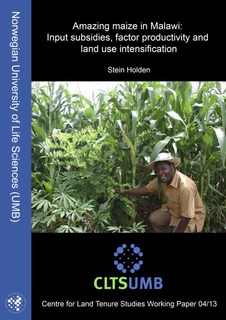Amazing maize in Malawi : input subsidies, factor productivity and land use intensification
The paper uses three years of household farm plot panel data (2006-2009), covering six districts in central and southern Malawi to assess factor productivity and farming system development under the input subsidy program. All farm plots of the households were measured with GPS. Maize production intensified in this period as maize area shares of the total farm size were reduced while input use intensity and yields increased. Yields of improved maize were significantly (+323 kg/ha) higher than for local maize.
Determinants of inorganic fertiliser use in the mixed crop-livestock farming systems of the Central highlands of Ethiopia
Use of inorganic fertilizers could be fundamental in addressing low and declining soil fertility while improving food security in sub-Sahara Africa. Determination of key factors responsible for use of inorganic fertilizers in the central highlands of Ethiopia is increasingly important as continued land redistribution in already degraded and land-scarce highlands undermines sustainable farming and increases nutrient mining.
Land reform
This chapter uses both classic and contemporary literature to trace how land policies, and particularly land reform, have gained, lost, and regained prominence in development strategies and debates since the Second World War. It introduces contemporary issues and debates on gender and generational issues in land policy and land grabbing involving sometimes spectacularly large corporate land deals, and concluding with reflections on new ideas of food and land sovereignty that drive today’s agrarian movements.
Governing land for women and men: A technical guide to support the achievement of responsible gender-equitable governance of land tenure
This technical guide on Governing land for women and men aims to assist implementation of the Voluntary Guidelines on the Responsible Governance of Tenure of Land, Fisheries and Forests in the Context of National Food Security (FAO, 2012b) by providing guidance that supports the Guidelines’ principle of gender equality in tenure governance. At the beginning of each module, reference is made to the relevant provisions in the Guidelines.
Improving governance of forest tenure: A practical guide
Decisions about resource tenure – or who can use what resources of the land for how long, and under what conditions – are among the most critical for forests and livelihoods in many contexts.
Democratic Republic of Congo
T he Democratic Republic of Congo (DRC) committed to the mitigation of the effects of climate change by signing the Kyoto Protocol for climate change and other related environmental management protocols. Since 1994, DRC has produced two national climate change communication documents (RDC, Ministère de l’Environnement, Conservation de la Nature, Eaux, et Forêts 2001; RDC, Ministère de l’Environnement, Conservation de la Nature et Tourisme 2009).
Global land governance: From territory to flow?
This article reviews recent research on contemporary transformations of global land governance. It shows how changes in global governance have facilitated and responded to radical revalorizations of land, together driving the intensified competition and struggles over land observed in many other contributions to this special issue. The rules in place to govern land use are shifting from ‘territorial’ toward ‘flow-centered’ arrangements, the latter referring to governance that targets particular flows of resources or goods, such as certification of agricultural or wood products.
Food security needs policy coherence
The 2013 OECD publication "Better Policies for Development" emphasises that building global food security requires a cross-cutting approach to policy coherence for development. It explores ways in which more coherent policies in advanced, emerging and developing economies alike, as well as, globally can contribute to improved global food security.
Food security, agricultural policy and the role of small-scale farms
Increasing prices for agricultural commodities offer a historic opportunity to intensify production systems for small-scale farmers in many developing countries. But without agricultural policies supporting them in making use of this opportunity, many of them would lose their access to land and income, resulting in aggravated food insecurity.
Agricultural policy reform and food security in China
In 1978, the rural reform began in China, and since then farmers, including the poor ones, have benefited from a steady growth in income and gradually strengthened food security. This article explains how China achieved food security in the past three decades, how the reform process has affected poverty reduction and what aims are established to deal with extreme poverty and child malnutrition for the period of 2011–2020.
FAO’s Monitoring African Food and Agricultural Policies initiative
Policy-makers often lack information and analytical capacity to effectively monitor how policies impact on different stakeholders. The MAFAP initiative of the Food and Agriculture Organization seeks to bridge this gap.










